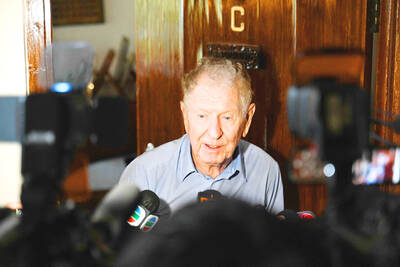The Taiwanese hand-puppet has been voted by the public as the image that would represent Taiwan to the world, after a campaign that began last December.
While the final results won't be officially announced until next Thursday in a presentation at the Presidential Office, the vote counts were made public on the campaign's Web site on Thursday.
The statistics on the Web site showed that 531,936 participants took part in the campaign and 130,285 of them decided the picture of the Taiwanese hand-puppet was their favorite. The runner-up, with 119,884 votes, was an image of Yushan (玉山), or Jade Mountain. The following three images were Taipei 101, with 55,495 votes; a picture of delicious Taiwanese dishes, with 18,073 votes; and a picture of the endangered Formosan Landlocked Salmon followed with 16,847 votes.
"The Government Information Office [GIO] will begin to randomly take advantage of these top five pictures as the images to represent Taiwan internationally from now on," a GIO official said.
The campaign of the images was carried out between Dec. 17 last year and Jan. 15. The GIO asked the public to choose between 24 different pictures to select an image to represent Taiwan internationally. Participants made their selections through phone calls, faxes or on the Web site.
New York Yankees pitcher Wang Chien-ming (

US PUBLICATION: The results indicated a change in attitude after a 2023 survey showed 55 percent supported full-scale war to achieve unification, the report said More than half of Chinese were against the use of force to unify with Taiwan under any circumstances, a survey conducted by the Atlanta, Georgia-based Carter Center and Emory University found. The survey results, which were released on Wednesday in a report titled “Sovereignty, Security, & US-China Relations: Chinese Public Opinion,” showed that 55.1 percent of respondents agreed or somewhat agreed that “the Taiwan problem should not be resolved using force under any circumstances,” while 24.5 percent “strongly” or “somewhat” disagreed with the statement. The results indicated a change in attitude after a survey published in “Assessing Public Support for (Non)Peaceful Unification

The CIA has a message for Chinese government officials worried about their place in Chinese President Xi Jinping’s (習近平) government: Come work with us. The agency released two Mandarin-language videos on social media on Thursday inviting disgruntled officials to contact the CIA. The recruitment videos posted on YouTube and X racked up more than 5 million views combined in their first day. The outreach comes as CIA Director John Ratcliffe has vowed to boost the agency’s use of intelligence from human sources and its focus on China, which has recently targeted US officials with its own espionage operations. The videos are “aimed at

‘MISGUIDED EDICT’: Two US representatives warned that Somalia’s passport move could result in severe retaliatory consequences and urged it to reverse its decision Minister of Foreign Affairs Lin Chia-lung (林佳龍) has ordered that a special project be launched to counter China’s “legal warfare” distorting UN Resolution 2758, a foreign affairs official said yesterday. Somalia’s Civil Aviation Authority on Wednesday cited UN Resolution 2758 and Mogadishu’s compliance with the “one China” principle as it banned people from entering or transiting in the African nation using Taiwanese passports or other Taiwanese travel documents. The International Air Transport Association’s system shows that Taiwanese passport holders cannot enter Somalia or transit there. The Ministry of Foreign Affairs (MOFA) protested the move and warned Taiwanese against traveling to Somalia or Somaliland

Four former Hong Kong opposition lawmakers jailed in the territory’s largest national security case were released yesterday after more than four years in prison, the first among dozens convicted last year to regain their freedom. Former legislators Claudia Mo (毛孟靜), Jeremy Tam (譚文豪), Kwok Ka-ki (郭家麒) and Gary Fan (范國威) were part of a group of 47 public figures — including some of Hong Kong’s best-known democracy advocates — who were charged with subversion in 2021 for holding an informal primary election. The case fell under a National Security Law imposed on the territory by Beijng, and drew international condemnation and warnings